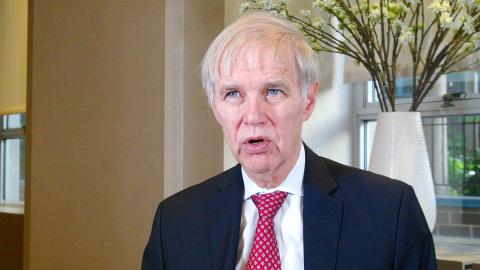A meeting between US President Donald Trump and Chinese President Xi Jingping (習近平) set to take place in Beijing next month should not have any major effect on Taiwan, former American Institute in Taiwan chairman Richard Bush said on Monday.
Bush, who serves as codirector of the Brookings Institution’s Center for East Asia Policy Studies, said in an interview with the Central News Agency in Washington that Taiwan would not be a bargaining chip in the Trump-Xi discussions.
It would not be a good idea for the US to use Taiwan as a bargaining chip, nor would it serve US interests, Bush said, adding that he was not very concerned about the impact that the Trump-Xi summit could have on Taiwan.

Photo: CNA
Asked if and how China would change its attitude toward Taiwan following the 19th National Congress of the Chinese Communist Party (CCP), Bush said only time would tell.
It is unlikely that Xi would normalize the relationship with Taiwan’s Democratic Progressive Party (DPP) government, because doing so would on some level indicate an acknowledgment of the legality of such a government, Bush said.
However, if China was waiting for the Chinese Nationalist Party (KMT) to return to power, then it would not be a good idea to continue to suppress the country as it has been doing since President Tsai Ing-wen (蔡英文) took office in May last year, Bush added.
Continuing to suppress Taiwan would only make Taiwanese unhappy, and fuel anti-China and anti-unification sentiment, he said.
Tsai had extended olive branches on multiple occasions, Bush said, adding that it is up to China to respond.
A key focus at the CCP congress would be how Xi attempts to change China’s interaction with Taiwan, he said.
Since Beijing froze communications across the Taiwan Strait due to the DPP administration’s refusal to acknowledge the so-called “1992 consensus,” Tsai has adhered to the “four noes” in cross-strait relations.
“Our goodwill will not change, our commitments will not change, we will not revert to the old path of confrontation and we will not bow to pressure,” Tsai said in her Double Ten National Day speech on Tuesday.
China has yet to reciprocate Tsai’s friendly gestures.
The “1992 consensus” refers to a tacit understanding between the KMT and Beijing that both sides of the Taiwan Strait acknowledge that there is “one China,” with each side having its own interpretation of what “China” means.
Former Mainland Affairs Council chairman Su Chi (蘇起) in 2006 said that he had made up the term in 2000.

A total lunar eclipse coinciding with the Lantern Festival on March 3 would be Taiwan’s most notable celestial event this year, the Taipei Astronomical Museum said, urging skywatchers not to miss it. There would be four eclipses worldwide this year — two solar eclipses and two lunar eclipses — the museum’s Web site says. Taiwan would be able to observe one of the lunar eclipses in its entirety on March 3. The eclipse would be visible as the moon rises at 5:50pm, already partly shaded by the Earth’s shadow, the museum said. It would peak at about 7:30pm, when the moon would

DEFENSE: The US should cancel the US visas or green cards of relatives of KMT and TPP lawmakers who have been blocking the budget, Grant Newsham said A retired US Marine Corps officer has suggested canceling the US green cards and visas of relatives of opposition Taiwanese lawmakers who have been stalling the review of a proposed NT$1.25 trillion (US$39.7 billion) special defense budget. The Executive Yuan has proposed the budget for major weapons purchases over eight years, from this year to 2033. However, opposition lawmakers have refused to review the proposal, demanding that President William Lai (賴清德) first appear before the Legislative Yuan to answer questions about the proposed budget. On Thursday last week, 37 bipartisan US lawmakers sent a letter to Legislative Speaker Han Kuo-yu (韓國瑜), the heads

Two siblings in their 70s were injured yesterday when they opened a parcel and it exploded, police in Yilan said, adding the brother and sister were both in stable condition. The two siblings, surnamed Hung (洪), had received the parcel two days earlier but did not open it until yesterday, the first day of the Lunar New Year holiday in Taiwan, police said. Chen Chin-cheng (陳金城), head of the Yilan County Government Police Bureau, said the package bore no postmark or names and was labeled only with the siblings’ address. Citing the findings of a

A New York-based NGO has launched a global initiative to rename the nation’s overseas missions, most of which operate under the name "Taipei," to "Taiwan Representative Office (TRO)," according to a news release. Ming Chiang (江明信), CEO of Hello Taiwan, announced the campaign at a news conference in Berlin on Monday, coinciding with the World Forum held from Monday through Wednesday, the institution stated in the release. Speaking at the event, Democratic Progressive Party Legislator Huang Jie (黃捷) said she believed this renaming campaign would enable the international community to see Taiwan